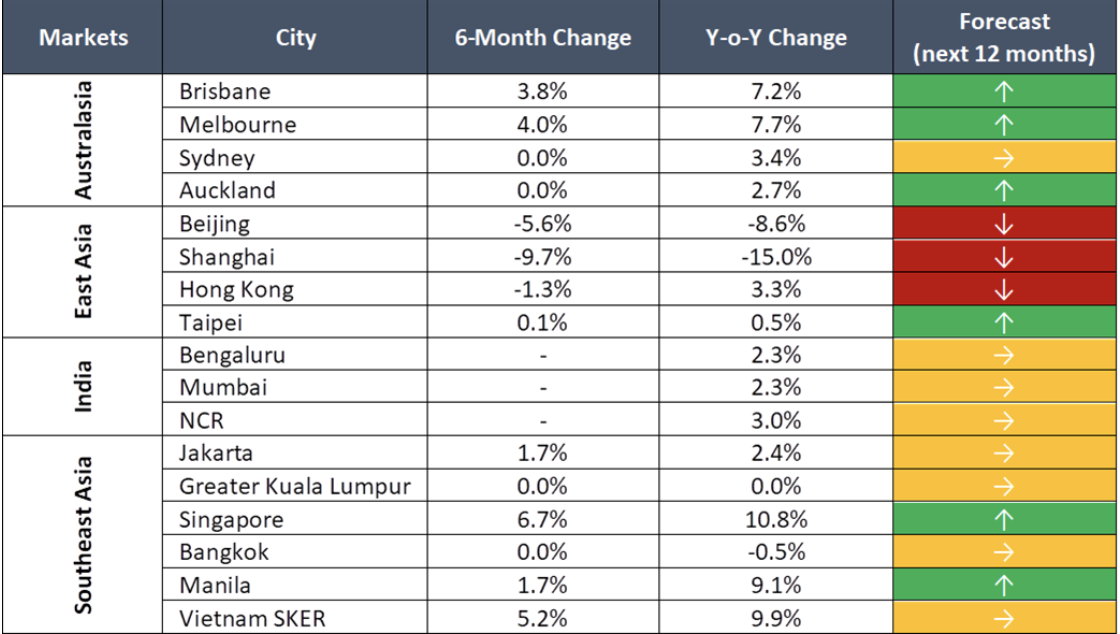SINGAPORE LEADS ASIA PACIFIC IN LOGISTICS RENTAL GROWTH AMID REGIONAL SLOWDOWN IN H1
Rental rates for logistics spaces in the Asia Pacific region have sustained their upward trend, although the growth has occurred at a more moderate pace compared with previous periods, according to a new Knight Frank report.
The independent global property consultancy firm said in its Asia-Pacific Logistics Markets report for H1 2024 that the region recorded an average year-on-year rental growth of 2.4% in the first half of the year, marking a significant slowdown from the 6.2% increase observed in 2023.
It noted that Singapore emerged as the standout performer in the region, with logistics rents increasing 6.7% from six months ago and 10.8% year-on-year, the highest growth recorded in ten years.
"Singapore's strong manufacturing led the growth, with the Purchasing Managers' Index expanding consecutively over the last 10 months," Knight Frank said.
"This strong performance is expected to continue, with forecasts projecting a 3% to 5% increase in prime logistics rents for 2024, as international manufacturers continue to view Singapore as an attractive location for their overseas operational expansion plans," it added.
Despite the overall positive trend, the global property consultancy firm noted that "14 out of 17 tracked cities" in the region recorded stable or increasing rents year-on-year in H1 2024, a marginal improvement from six months ago — indicating a "broader pattern" of growth across most markets, even as the pace moderated.
"Global supply chains have again contended with disruptions this year, which have lifted transportation overheads. Consequently, margin pressures have continued to remain significant amid weaker consumer demand. Most occupiers are also anticipating higher rental rates on lease renewals," commented Tim Armstrong, global head of occupier strategy and solution at Knight Frank.
"Constrained by the fragile economic outlook and challenging operating conditions, occupiers will continue to scrutinise space requirements. Leveraging technology and strategically aligning logistics footprints will remain key priorities," he added.
"Occupiers are expected to be increasingly discerning when considering expansion spaces."
Slowdown driven by challenging conditions in China markets
Knight Frank noted that the slowdown in rental growth was primarily attributed to challenging conditions in Chinese Mainland markets, particularly Beijing and Shanghai.
It said that a slowdown in business activity led to a significant 13.5% decline in rentals, with vacancy rates climbing to over 20% and has prompted landlords to implement rental reductions and offer shorter lease terms to attract and retain tenants.
"Although conditions in Beijing and Shanghai are sharply in contrast with the rest of the region, still, it remains clear that logistics occupier markets are on the whole transitioning to a more neutral state from one favouring landlords. However, despite moderating demand, the long-term fundamentals supporting the region's logistics space market remain intact," said Christine Li, head of research, Asia-Pacific, Knight Frank.
"As supply chains shift, manufacturing is emerging to be an important sector driving logistics development, along with e-commerce and 3PL players."
"While there will be ample flight-to-quality options in Beijing and Shanghai, these markets will remain under pressure until adsorption capacity picks up," Li added.
[Source: Knight Frank]
In the next 12 months, Knight Frank expects logistics rents in the Asia Pacific to remain relatively stable. Eight out of its 17 tracked cities in the region have stable rates and six are forecasted to see increased rents, led again by Singapore.
Meanwhile, logistics rents are expected to go down in three East Asian cities—Beijing, Shanghai and Hong Kong—in the next 12 months.





